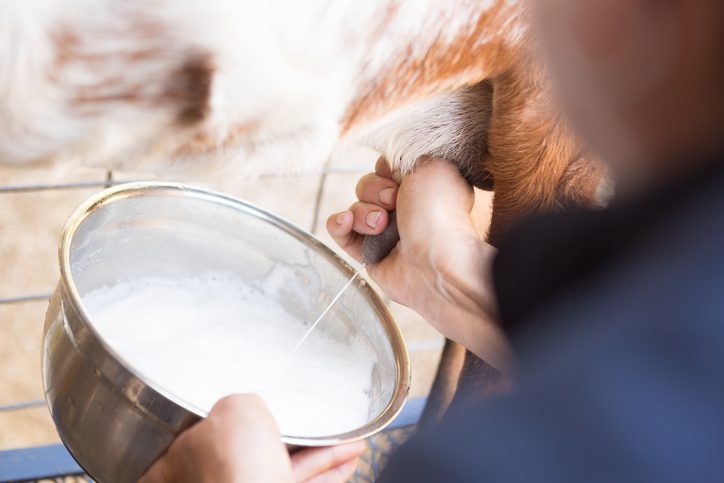 I’ve heard lately that some Vets have poo-pooed goat milk saying that it can be a source of Salmonella, E-Coli and Listeria. This is a myth. While this could be true of any raw food, a great deal of care is used in the manufacturing and distribution of raw products for just that reason. FACT: We only sell goat milk and other raw foods that test
every single batch for Salmonella, E-coli and Listeria prior to release for distribution. FACT:
We only order from companies that believe in third party testing, taking that extra measure that the product is disease free. We also verify that our distributors take extra precautions in their product storage and also their truck distribution to our store ensuring that the quality and freshness of the products remain in tact.
I’ve heard lately that some Vets have poo-pooed goat milk saying that it can be a source of Salmonella, E-Coli and Listeria. This is a myth. While this could be true of any raw food, a great deal of care is used in the manufacturing and distribution of raw products for just that reason. FACT: We only sell goat milk and other raw foods that test
every single batch for Salmonella, E-coli and Listeria prior to release for distribution. FACT:
We only order from companies that believe in third party testing, taking that extra measure that the product is disease free. We also verify that our distributors take extra precautions in their product storage and also their truck distribution to our store ensuring that the quality and freshness of the products remain in tact.
While there are several vendors that offer fresh goat milk, Primal is one of our favorites. Primal Pet Foods take great care to use healthy goats to produce the milk, and follow strict testing regulations. FACT: Goat milk is known as the “universal milk” and can most easily be absorbed by a variety of mammals. Myth: Goat milk is dairy milk. FACT: Dogs and cats are lactose intolerant, but in Primal Goat Milk the lactase remains intact and active as it is never pasteurized or exposed to heat. There are many benefits to goat milk. It contains vitamins, minerals, electrolytes, trace elements, enzymes, protein, and fatty acids all easily utilized by the body.
Primal uses goats that are on a ‘Certified Humane’ family farm. All goats are raised hormone and antibiotic free, and are fed natural hay and grasses. Goats are free range and are given plenty of room to run and graze. Like the saying goes… A happy goat offers only happy milk.
Primal adds important spices and supplements to the all natural goat milk including:
- Cinnamon – added as an antibacterial/antifungal and can assist with arthritis and muscular inflammation in older animals.
- Ginger – added as a digestive aid and natural antioxidant.
- Turmeric – added as natural anti-inflammatory, antioxidant, detoxifier and anti-cancer herb
Probiotics added to milk:
- Lactobacillus Acidophilus – Increase immune resistance against such harmful bacteria and fungi as Candida albicans, Salmonella, E. coli, and Staphylococcus aureus; this helps control intestinal infections, thus reducing the potential of diarrhea and other infections or diseases.
- Lactobacillus Lactis – Able to synthesize both folate and riboflavin, two key B vitamins. Produces large amounts of lactic acid. This is used in to treat Irritable Bowel Disease (IBD).
- salivarius – In one study printed in the American Journal of Gastroenterology (1998), L. salivarius, was able to produce high amounts of lactic acid (urease) and completely inhibited the growth of H. pylori in a mixed culture; H. pylori is the main causal agent of duodenal ulcers.
- Enterococcus Facium – Provides important nutritional support in the event of diarrheal diseases, especially in cases when such pathogenic microbes, as rotavirus, invade the bowel. A transient bacterium, E. faecium needs to be replaced continually. In several studies, it has proved resistant to a wide variety of antibiotics and proved to be more effective than L. acidophilus in shortening the duration of diarrheal episodes.
We only sell goat milk that test all batches for Salmonella, E-coli and Listeria prior to release for distribution. Our Primal goat milk is sold frozen, and should be stored in your freezer prior to use. Let the milk defrost by placing the container in your refrigerator twenty- four hours prior to using. You can refreeze the original container while still half frozen. Be sure to always shake the container before using to stir up any added spices and supplements. One it is thawed in the refrigerator, it will last 10 days or up to 1 year completely frozen.
If you are feeding goat milk for the first time, as with any new food, I suggest you slowly transition it into their food by starting with 1 tablespoon of goat milk. Add the goat milk to your dog or cats bowl at one feeding per day and increase to 2 tablespoons within the first week.
The benefits of adding goat milk are many. FACT: In addition to the nutritional value, it aids in your pet’s digestion, and it helps them obtain their daily need for moisture. Both dogs and cats have bodies that consist of 65% moisture and are designed to seek their water from the foods they eat. Raw goat’s milk is 88% moisture so adding goat’s milk will also help them get the benefits of moisture. Lastly, dog and cats love goat milk so adding it to their food can entice them to eat their kibble. The results we’ve seen over the many years of offering Primal goat milk to our customers range from less tear stains, improved digestion, helps with skin allergies and also decreased yeast issues as this balances out the bacteria in your cat or dogs belly. So come in for a FREE sample and see why Primal goat milk is considered our favorite addition to any healthy dog or cat food regimen.


